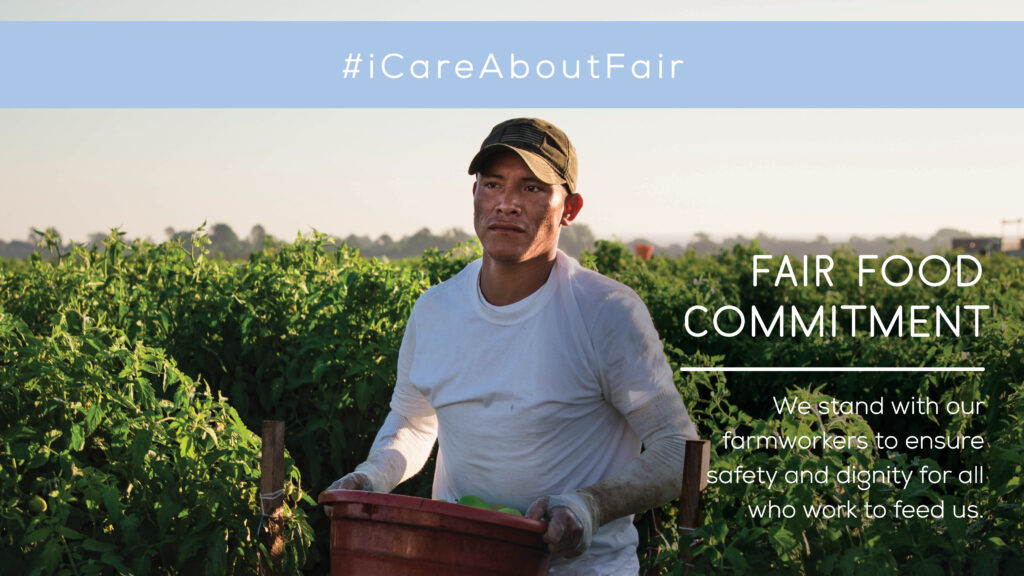In 2020 Compass Group bought 7.5million pounds of tomatoes from Florida farms that participate in the Coalition of Immokalee Workers’ (CIW) Fair Food Program. As executive director of the Fair Food Standards Council, Judge Laura Safer Espinoza is responsible for monitoring these farms to ensure they pay farm workers the bonus made possible by Compass and other food buyers, as well as implement a human rights-based code of conduct.
Judge Espinoza has held this position since 2011, two years after Compass Group became the first company to sign a historic agreement with the CIW, raising their wages and enforcing the human rights code. To help promote Farmworker Awareness Week, Judge Espinoza spoke with us about the progress in workers’ pay, health and safety since Compass signed its agreement with the CIW in 2009.

Q. You joined the Fair Food program in 2011. Describe the working conditions you witnessed nine years ago and compare it the conditions today.
A: We witnessed many of the abuses commonly found in agriculture, ranging from systemic wage theft, health and safety violations and sexual harassment, to verbal and physical abuse. There were also cases of sexual assault and retaliation against workers who raised complaints. Before the Fair Food Program (FFP), federal prosecutors called southwest Florida “ground zero for modern day slavery”.
By 2011, nine buyers, including Compass, had joined the FFP. That motivated the entire Florida Tomato Growers Exchange to join, which allowed us to implement our program, which includes worker education of their rights under the Code of Conduct, a 24/7 worker complaint hotline, and enforcing corrective actions if an incident occurs.
By the fourth season, most systemic code violations had been resolved. Workers saw their concerns addressed and solutions implemented without retaliation.
Q. How does Compass Group contribute to the success of CIW’s FFP?
A: Compass’ support is absolutely critical to the success of enforcement of workers’ human rights because standards without enforcement are meaningless. In its agreement with CIW, Compass commits to stop purchases from any grower suspended from the FFP. This commitment ensures compliance with workers’ human rights.
There is a coalition of Fair Food Chefs within Compass Group with representation across its sectors to also help drive the partnership forward. Compass is working hard to promote FFP expansion in its supply chain. We are looking forward to announcing the entry of new crops and growers into the FFP, in the very near future. Finally, Compass looks for opportunities to promote the FFP to members of the consuming public during Farmworker Awareness week and beyond.
Q. What has been your interaction with Compass Group?
A: Compass has sent several delegations to Immokalee to learn about the FFP. They definitely listen to the testimony of CIW staff who have worked in the fields. Some people from Compass became quite emotional when hearing these stories and about the changes the company has helped to accomplish. This was special for us.
Compass is dedicated to working with us to expand the Fair Food program. We meet often with Alison Weber, chief creative officer at Levy Restaurants and Graham Givens, sustainability manager at Foodbuy, who are part of a working group Compass has formed to move our partnership forward.
We all look for quality in our produce, and human rights needs to be part of that quality. Consumers need to be made aware of what they can do to support humane working conditions. Buyers like Compass will help us educate consumers and take the FFP to farms across the US.
We are grateful to Compass for their support. It is what has made human rights on the ground real. Because of their help, the world we came into in 2011 has been transformed.
Q. How do you ensure the growers comply with the agreement?
A: The collaboration of participating growers has been essential to making the fundamental changes required by the code. This is a program based on cooperation and risk prevention, which benefits all concerned.
We have full access to grower management, field-level supervisors and workers in the field, as well as at housing. We have unprecedented access to records, including payroll. We provide detailed reports and based on audit findings and negotiate corrective action plans with growers. Our 24/7 complaint line provides a live video feed of information about conditions on participating farms. In effect, there is a risk prevention model in place, backed by market consequences.
Make no mistake, food buyers like Compass Group are critical and make enforcement of the FFP possible.
Related:
Compass Group USA 2019 Corporate Social Responsibility Report // Organic Valley: Nature’s Perfect Design // Global Animal Partnership Agreement



Leave a Reply
You must be logged in to post a comment.